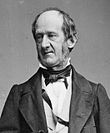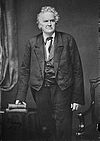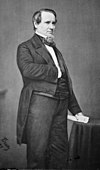United States House of Representatives elections, 1850
|
|
|||||||||||||||||||||||||||||||||||||||||||||||||||||||||||||
|---|---|---|---|---|---|---|---|---|---|---|---|---|---|---|---|---|---|---|---|---|---|---|---|---|---|---|---|---|---|---|---|---|---|---|---|---|---|---|---|---|---|---|---|---|---|---|---|---|---|---|---|---|---|---|---|---|---|---|---|---|---|
|
|||||||||||||||||||||||||||||||||||||||||||||||||||||||||||||
|
All 233 seats to the United States House of Representatives 117 seats were needed for a majority |
|||||||||||||||||||||||||||||||||||||||||||||||||||||||||||||
|
|||||||||||||||||||||||||||||||||||||||||||||||||||||||||||||
|
|||||||||||||||||||||||||||||||||||||||||||||||||||||||||||||
Elections to the United States House of Representatives for the 32nd Congress were held at various dates in each state from August 5, 1850 (Iowa and Missouri) to November 4, 1851 (Louisiana and Mississippi). The Democrats gained 17 seats, increasing their majority relative to the Whigs, who lost 22 seats.
Whig President Millard Fillmore, who had gained the presidency after the death of Zachary Taylor, grew increasingly unpopular. The election saw sectionalism and slavery continue to emerge as major issues.
The Constitutional Union Party, formed in support of the Compromise of 1850, gained 10 seats (its first ever) in Georgia, Mississippi, and Alabama. The Free Soil Party, which was strongly abolitionist, lost five seats and was reduced to four Representatives, all in New England districts. The States' Rights Party, a pro-slavery states' rights party, gained ground in Georgia and Mississippi.
...
Wikipedia





